698 Search Results for model
April 7, 2015
by Carole Zangari -
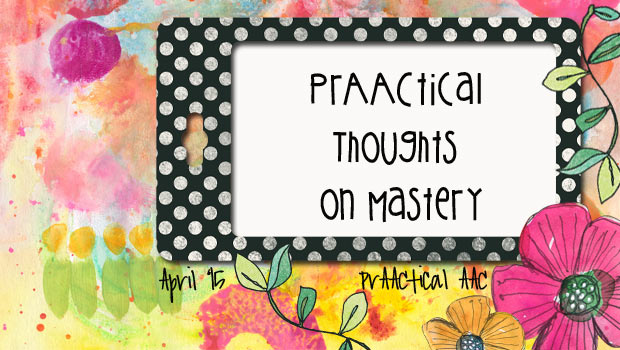
In many clinical training programs, new SLPs are taught to teach skills to mastery level, which generally means something like “80% over 3 consecutive sessions.” For our clients who are developing communication skills using AAC, though, this isn’t always the best approach. Here’s why. It doesn’t always make sense. Having a single standard for mastery is useful as a clinical management tool, but often doesn’t make sense in individual situations. Consider the skill itself. Would you be comfortable with your clients being 80% accurate when they: Cross the street? (Of course not.They need to be 1,000% accurate with that.) Ask for things? (Probably. Although Johnny has many days where he’s pretty happy with everything and doesn’t really have clear preferences or desires that we can ascertain. It would be nice to respect that. Not to mention the fact that he might want something that we haven’t offered him.) Make a... [Read More...]
April 6, 2015
by Carole Zangari -
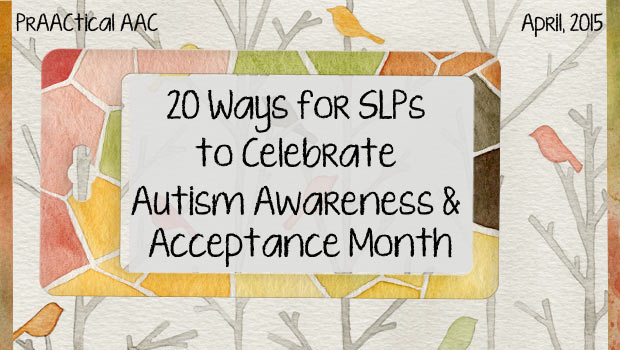
As SLPs, we know a good deal about autism spectrum disorders. Nevertheless, there’s always some new area to explore. Here are some ideas. Learn about and from self-advocates with ASD. Get inspired to learn more about video modeling and self modeling. Enroll in a MOOC (Massive Open Online Course) on Autism, like this one by Swinburne University of Technology. Learn more about what makes a narrative a social story as opposed to something else by reviewing the guidelines for sentence types. Take a ‘real look’ at a speech-language therapy session where the focus is coaching a family member to build play and interaction skills. Learn more about the neurodiversity and the neurodiversity movement. Share some of the empirical supports for AAC use. Learn more about DSM 5. Take a ‘real look’ at a family whose child has Down Syndrome and autism. Renew your commitment to theoretically sound and empirically supported... [Read More...]
April 2, 2015
by Carole Zangari -
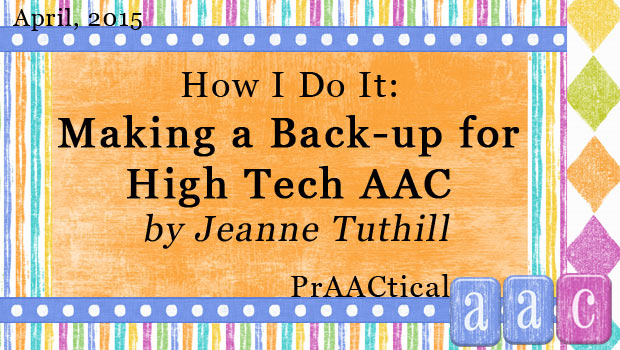
If you’ve ever woken up in the middle of the night sweating over one of your AAC clients who doesn’t have a back-up communication tool, then this post is for you. Jeanne Tuthill is back with another prAACtical suggestion, this time on the importance of ensuring that people with AAC needs have communication options when their technology isn’t available or appropriate. In keeping with the generous spirit of the AAC field, Jeanne also shares her files for this project. Enjoy! How I Do It: Making a Back-up for High Tech AAC Each time I teach my graduate class I try to invite at least one AAC user in as a guest speaker to share their story with the students in the class. It never ceases to fill my students with awe and appreciation for the challenges that AAC users face on a daily basis. My students often list it as... [Read More...]
March 26, 2015
by Carole Zangari -
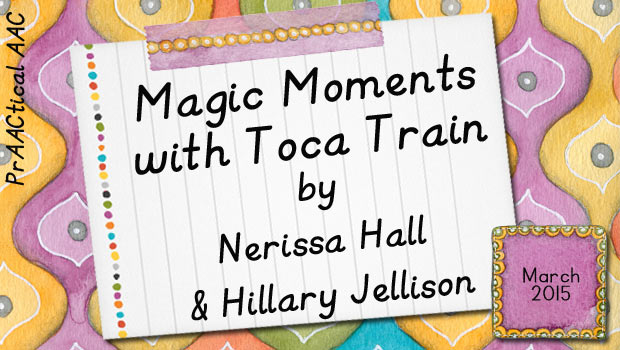
Many of us have worked with learners who have a special interest in trains, but even kids who don’t give trains more than a passing glance still generally love the Toca Train app by Toca Boca. In this post, we welcome back SLPs Nerissa Hall and Hillary Jellison of Communicare, LLC who share how they use Toca Train in their clinical work with young AAC learners. In addition to their prAACtical suggestions, they generously share a train-themed communication board and their data sheet for the phrases that can be targeted in this activity. iPad applications are fun and engaging, and can be a great addition to any clinician’s intervention toolkit. We use iPad applications to engage our learners in play-based activities that address a range of speech, language, and communication goals. One of our learners’ favorite applications is Toca Train; a bright and colorful application that involves a train moving around a track at different speeds, controlled... [Read More...]
March 16, 2015
by Carole Zangari -
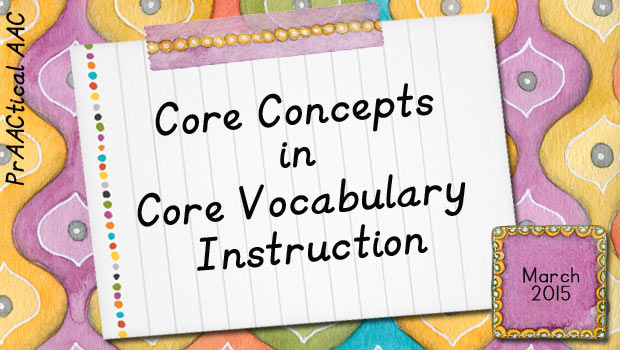
We’ve been talking about implementing A Year of Core Words and A(nother) Year of Core Words for our March words. If you are new to the idea, it involves highlighting a different set of set of 12-16 core words each month to help our AAC learners get progressively more familiar with their vocabulary options. Today, we’re linking to some posts with ideas for what to do with the core words for each month. Laying the Foundation Give learners access to core vocabulary in their communication books, SGDs, and/or AAC apps. Prepare the core vocabulary materials for the month. If you haven’t started, don’t sweat it. Just download, print, and give it a go. “A year from now, you will wish you had started today” (K. Lamb). We are ALL a work in progress. Use the core words in an AAC system when you speak. Whether we call it aided language... [Read More...]
March 2, 2015
by Carole Zangari -
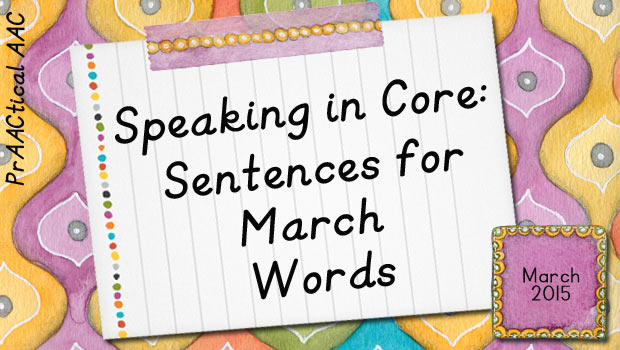
For the past 5 years, AAC practitioners have become increasingly invested in a core word approach to AAC intervention. Why spend valuable intervention time teaching words that relate only to one specific activity or environment when you could be teaching words that the learner can use all day long? Building competency with a robust base of 300-500 core words gives people the vocabulary they need to function in any environment. (Try that with AAC systems that are mostly nouns and action verbs!). How can we continually increase our clients’ competence with core words? A few years ago, we decided to approach this by focusing on 12-16 core words each month. Each month, we would highlight those words in our conversation (aided language input), direct intervention, and home programming activities with AAC learners. The repeated experiences with those 12-16 words helped the learners develop new skills, and kept the team focused... [Read More...]
February 26, 2015
by Carole Zangari -
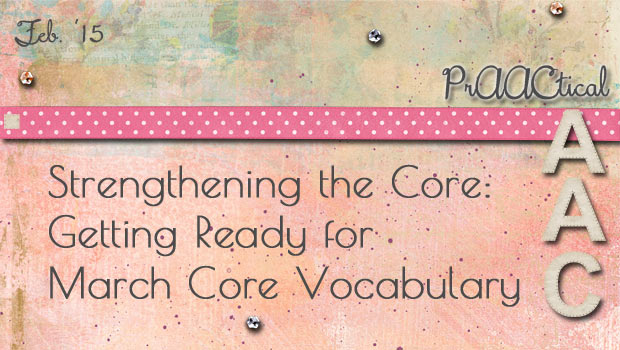
March is around the corner, so if you are following along our 2013 Year of Core (12 words/month) or the 2014 A(nother) Year of Core (16 words/month; Different than the previous year’s core words), it is time to get ready to focus on a new set of words. “Wait! My clients/students didn’t master the January or February words. Should I really go on?” Yes, you probably should! Every situation is different, of course, but for the vast majority it makes sense to move on. Sticking with the same set of words is likely to bore you and frustrate the kids. With a core word approach, it’s about progress, not perfection. We aren’t giving up on the prior words. In fact, we will continue to model them (with aided language input) and create opportunities for our learners to use them, providing supports, as needed). At the same time, we’re expanding our focus to... [Read More...]
February 23, 2015
by Carole Zangari -
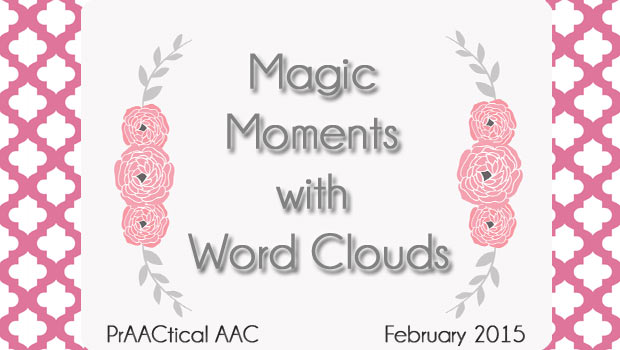
It’s been quite a while since we’ve done a Magic Moments post, and I’ve got a backlog of digital tools and tangible materials that we’ve used in our prAACtical therapy sessions and too little time to write about them. In this post, let’s look at word clouds. You may not be familiar with the term, but you certainly know them when you see them. Word clouds are images made from text. The larger the word in the image, the more frequently it appeared in the text. Here’s one made from the paragraph you are reading right now. Take a look to see which words are the largest and you’ll know which ones were repeated most often in this paragraph. There are lots of sites and apps that you can use to make word clouds and there are links to some of them at the end of this post. But, first, let’s... [Read More...]
February 17, 2015
by Carole Zangari -
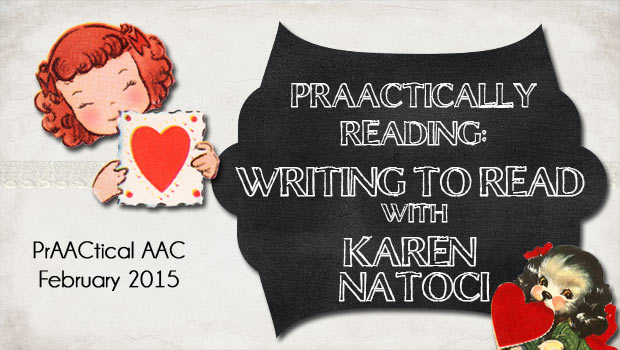
We are so pleased to have SLP Karen Natoci back with the second edition of PrAACtically Reading. You can see her first post here. I love that this lesson focuses on older students, providing an age respectful activity (who else loves Mad Libs?!) and a prAACtical way for students with lower verbal skills to develop their reading abilities. Writing to Read: Mad Lib, Core Words, and Literacy Instruction Core Vocabulary focus: like, dislike, uh-oh, again Sometimes it is fun to just write our own BIG BOOK and this month, we decided to do that by using a simplified “mad libs” format. Honestly, I’m not sure who had more fun, the teachers, the student authors or myself! I was inspired by the work of Gretchen Hanser. I attended her workshop on writing at Oakland Schools (MI) in the fall of 2013. She showed us that all students develop writing and experience... [Read More...]
February 12, 2015
by Carole Zangari -
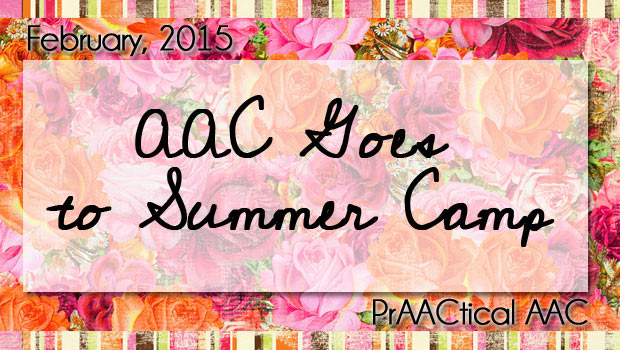
Those of you who are still digging your way out of the most recent snowstorm may not believe it, but it’s almost time to make plans for summer. There are quite a few AAC camps, some that are quite well established and others that have been running for only a few years (see our AAC Camp Pinterest board here). In this post, we hear about one of them from Tina Moreno, an SLP and mom of Mateo, who uses PicturePower 100 on the Maestro to communicate, maintain friendships with his teammates on the cross country team, advocate for himself, reveal his wicked sense of humor, and even sing the National Anthem for his high school’s basketball games. Tina blogs at Voices4All. With the help of Drs. Karen Erickson and David Koppenhaver, she and her friend Gina Cunningham created Camp ALEC together in memory of Gina’s son Alec, who never gave up, and... [Read More...]









